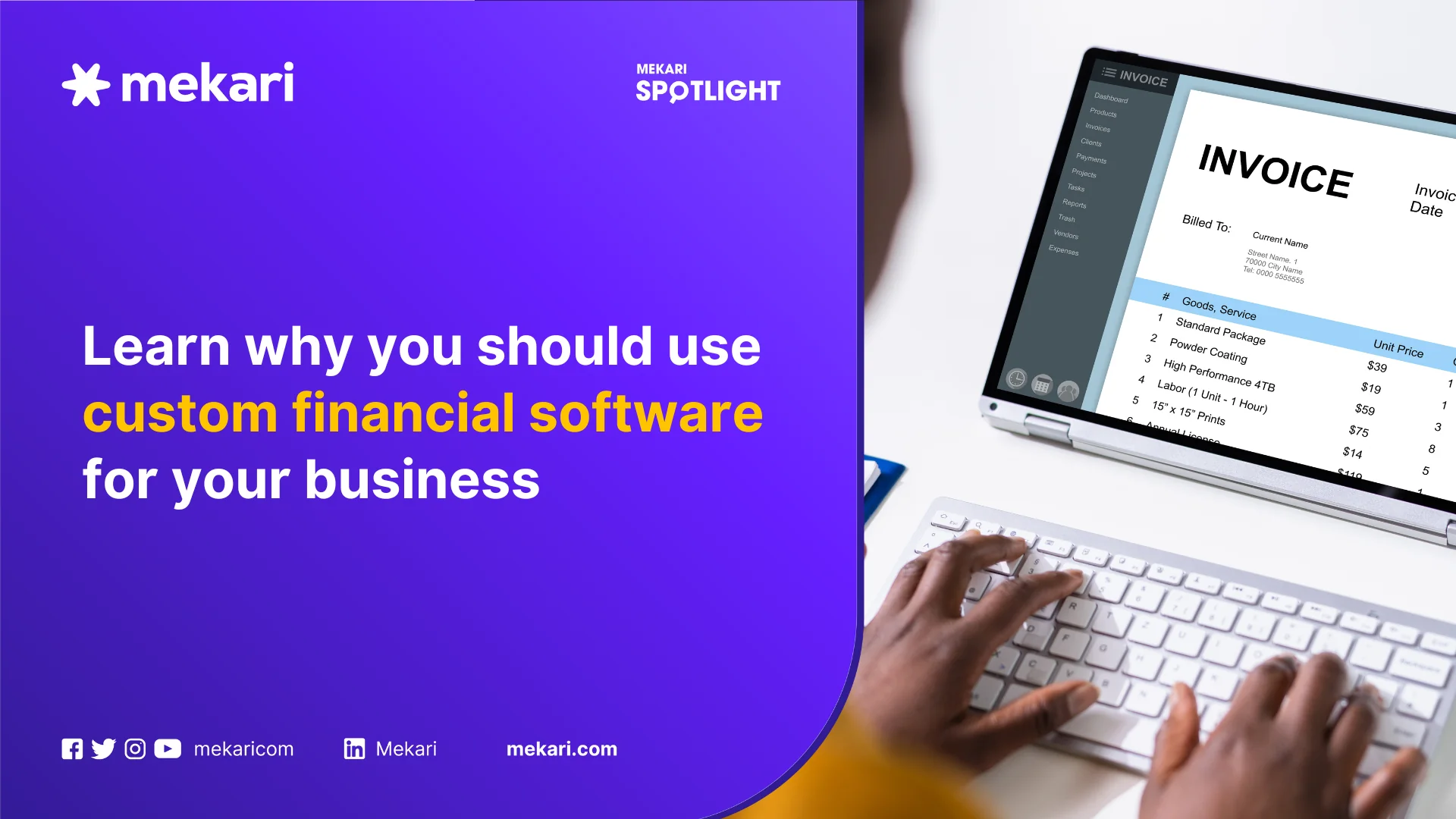Mekari Insight
- Custom financial software is designed specifically for a business’s needs. Unlike off-the-shelf solutions, it eliminates unnecessary features, improves efficiency, and aligns seamlessly with existing workflows.
- Custom solutions evolve with financial regulations, market demands, and business expansion.
- Financial businesses rely on multiple systems—custom software connects everything smoothly, reducing manual effort and errors.
In the financial world, one-size-fits-all software rarely meets the mark. Custom financial software development gives institutions the flexibility to build solutions that align with their specific needs—whether it’s AI-driven fraud detection, real-time analytics, or seamless regulatory compliance.
Unlike generic platforms, custom-built systems evolve with changing regulations and market demands, keeping financial organisations efficient, secure, and ahead of the curve.
This article explores why tailored financial software is redefining the industry and the key benefits it brings.
What is custom financial software development
Custom financial software development is a tailor-made solution designed to address the specific needs of financial institutions, businesses, and organizations.
Unlike off-the-shelf software that offers generic functionalities, custom solutions are built to align with unique business workflows, regulatory requirements, and security standards.
These are several types of custom financial software solutions.
1. Core banking and digital banking solutions
Modern banking requires more than just traditional account management. Custom banking software enables financial institutions to offer seamless, secure, and real-time banking experiences. Key features include:
- Core banking systems: Centralized management of accounts, transactions, and compliance reporting.
- Digital and mobile banking apps: Secure, user-friendly apps for payments, fund transfers, and customer engagement.
- Cloud banking platforms: Scalable solutions that support multi-branch banking, digital onboarding, and AI-driven customer support.
2. Investment and wealth management software
Investors and asset managers rely on technology to optimize portfolios, assess risks, and comply with evolving regulations. Custom investment software provides:
- AI-powered portfolio management: Smart automation for asset allocation, performance tracking, and predictive analytics.
- Market data aggregation: Real-time feeds from stock exchanges, commodities, and forex markets.
- Regulatory compliance: Built-in tools to ensure adherence to SEC, AML, MiFID II, and other financial regulations.
3. Risk management and fraud prevention systems
With financial fraud and cyber threats on the rise, institutions must invest in proactive security measures. Custom risk management software includes:
- Predictive analytics & machine learning: Identifies fraudulent transactions and unusual activity before damage occurs.
- Regulatory risk assessment: Ensures compliance with KYC (Know Your Customer) and AML (Anti-Money Laundering) requirements.
- Automated fraud detection: AI-driven monitoring that flags suspicious transactions in real time.
4. Custom payment processing platforms
Businesses and financial institutions need secure and efficient payment gateways that support global transactions. Custom payment solutions offer:
- Multi-currency and multi-channel support: Seamless integration for online, in-store, and cross-border payments.
- PCI DSS compliance: High-level encryption and fraud protection for secure transactions.
- Smart billing & automated invoicing: Customizable billing structures, tax calculations, and recurring payment automation.
5. E-procurement and financial workflow automation
Procurement and financial operations can be complex, involving multiple stakeholders and regulatory oversight. Custom e-procurement software simplifies these processes through:
- Supplier management & e-tendering: Automates vendor selection, contract negotiations, and bidding processes.
- Spend analysis & budget tracking: Provides real-time insights into procurement costs and budget allocations.
- ERP & accounting integration: Seamless connection with enterprise resource planning systems for financial oversight.
Benefits of custom solutions over off-the-shelf products
Choosing custom financial software over pre-built solutions is like having a suit tailored specifically for you. It fits better, works efficiently, and evolves with your needs. Here are the key advantages:
1. Perfect fit for business processes
Every financial institution has unique workflows, compliance needs, and operational structures. Custom software is designed to match these exact processes, eliminating unnecessary features and inefficiencies.
Instead of forcing your business to adapt to a rigid system, custom solutions align with how you already work, improving productivity and decision-making.
2. Scalability and flexibility for growth
Off-the-shelf software often comes with limitations, making it difficult to expand or add new features as your business grows.
Custom solutions are built to scale, allowing you to integrate new functionalities, support a larger user base, or expand into new markets without major disruptions. This flexibility ensures that your software remains relevant and effective long-term.
3. Seamless integration with existing systems
Financial businesses rely on multiple platforms, such as accounting software, customer management tools, and compliance systems. Generic software may struggle to communicate with these tools, leading to inefficiencies.
Custom financial software is designed for smooth integration, ensuring seamless data flow, automation, and reduced manual effort. This leads to better efficiency, accuracy, and a more streamlined operation.
Key considerations before choosing a development partner
Choosing the right software development partner is crucial for long-term success. To minimize risks and maximize efficiency, businesses should focus on key factors such as financial stability, business alignment, technical expertise, and post-launch support.
1. Vendor financial stability and reputation
A vendor’s financial stability ensures long-term project sustainability. Assessing revenue consistency, R&D investments, and financial audits helps avoid risks like sudden insolvency.
Beyond finances, industry expertise is key. Reviewing case studies, client portfolios, and certifications (e.g., ISO, Clutch rankings) confirms credibility and reduces implementation risks.
2. Alignment with business objectives
A vendor should understand your compliance, security, and operational needs. Their ability to tailor solutions and integrate seamlessly with existing systems ensures long-term usability.
Scalability is also critical. A partner experienced in modular, cloud-native, or adaptable architectures helps future-proof your software as business needs evolve.
3. Post-implementation support and maintenance
Software requires ongoing maintenance to remain efficient and secure. A strong SLA with fast response times and proactive monitoring reduces downtime.
Regular updates and security patches ensure continued compliance and protection against cyber threats, keeping your system reliable in the long run.
4. Cost transparency and total ownership analysis
Clear pricing structures prevent unexpected costs. Understanding different models—fixed, time-based, or hybrid—helps with budgeting and financial planning.
Beyond initial costs, evaluating the total cost of ownership (TCO) ensures long-term affordability by factoring in maintenance, scalability, and operational savings.
5. User experience and training
A well-designed UI/UX reduces training time and improves user efficiency, leading to higher software adoption rates.
Additionally, comprehensive onboarding, training materials, and ongoing support ensure smooth adoption and minimal learning curves.
Recommendation of custom finance software development
Custom financial software helps businesses streamline operations, enhance security, and scale effectively. Unlike one-size-fits-all solutions, tailored software adapts to unique workflows, ensuring seamless integration and long-term efficiency.
Mekari Officeless provides custom enterprise software development. Powered by a no/low-code platform, Mekari Officeless helps businesses build the right financial solutions efficiently. Trusted by leading companies, our solutions support:
- PT Bank CIMB Niaga Tbk: Expense Management
- PT Tiki Jalur Nugraha Ekakurir (JNE): Billing Management System (BMS)
- PT Bank Victoria: Loan Channeling
With a strong track record in financial technology, Mekari Officeless enables businesses to develop custom financial solutions that drive growth and operational excellence.
References
ScaleupAlly. ”Financial Software Development: A Comprehensive Guide”


